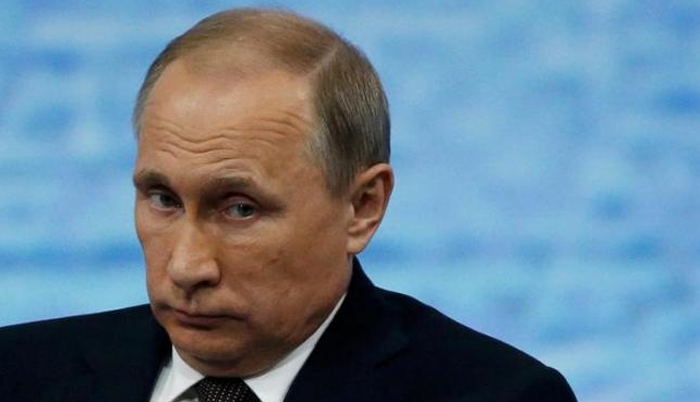![]() Home > Europe
Home > Europe
Cracks Emerge in the European Consensus on Russia

Russian President Vladimir Putin attends a session of the St. Petersburg International Economic Forum 2016 (SPIEF 2016) in St. Petersburg, Russia, June 17, 2016. | PHOTO: Reuters/Grigory Dukor/File Photo
![]() June 21st, 2016 | 07:43 AM |
June 21st, 2016 | 07:43 AM | ![]() 1791 views
1791 views
BERLIN
As the European Union squabbled over refugees, Greek bailouts and austerity in past years, it showed striking unity in another area: its resolve to punish Russia for the annexation of Crimea and support of separatists in eastern Ukraine.
That consensus was possible because German Chancellor Angela Merkel was able to keep Russia-friendly members of her own government on-side and convince skeptical EU states like Slovakia, Hungary and Italy to back extensions of the bloc's economic and financial sanctions against Moscow.
Another six month extension seems likely to be agreed on Tuesday. But that cannot hide the fact that the mood in Berlin is shifting. And with that shift, the first real cracks are emerging in the European consensus on how to deal with Russian President Vladimir Putin.
In recent weeks, as NATO advanced plans to deploy battalions along Russia's western border, Russian athletes were banned from the Olympic Games over doping and Moscow was threatened with ejection from the European soccer championships because of violent fans, officials in Berlin have begun to express concern that ties with Moscow could suffer irreparable damage.
Coupled with these fears has been growing frustration with the government in Ukraine and its struggles to implement its side of the Minsk peace deal by pushing through a law that would allow elections to take place in the disputed east.
More generally, some German and European officials have begun questioning how many fronts Europe can afford to fight at a time when the bloc faces major threats like Brexit, attacks from Islamic State militants and the simmering refugee crisis.
"People are tired of confrontation with Russia. They don't like the tensions and they see that Ukraine is not delivering enough on the reform front," said Ulrich Speck, a senior fellow at the Transatlantic Academy in Washington.
"When you're confronted with ISIS, Putin doesn't look so bad. Because of this fatigue, there is a growing risk that the anti-sanctions camp grows stronger," Speck said, a view also expressed by officials in the United States, which has imposed its own sanctions on Russia over Ukraine.
DIVIDE
Over the past weeks the divide between the parties in Merkel's "grand coalition" government has widened, with German Foreign Minister Frank-Walter Steinmeier leading the push for a more conciliatory approach towards Russia, and a step-by-step easing of sanctions.
At the weekend, he raised eyebrows by suggesting that NATO risked provoking Russia with military maneuvers in eastern Europe. "What we shouldn't do now is to inflame the situation by loud sabre-rattling and shrill war cries," he told the Bild newspaper.
There are two ways to read Steinmeier. The first is that he is playing good cop to Merkel's bad cop, and that the hardline German stance on sanctions is unlikely to change substantially.
"What has changed on Russia policy? I think nothing has changed," said one senior German diplomat. "Still, with the sanctions deadline looming, we have to show we are doing everything we can to engage with Russia."
The other interpretation is that Steinmeier's comments point to a deeper split between Merkel's conservatives and his Social Democrats (SPD) which will only grow as the 2017 German election approaches. Some officials fear this split could send a signal of disunity to Berlin's partners, undermining the EU consensus.
One thing is sure: domestic German politics is playing a role in the Russia debate. Steinmeier has come under significant pressure from SPD leader Sigmar Gabriel over the past month to soften his rhetoric on Russia, officials familiar with their discussions say.
SYMBOLIC VISITS
Gabriel is the presumptive challenger to Merkel in next year's election and is scrambling for issues that can lift the struggling SPD in the polls and differentiate them from the chancellor's conservatives.
Russia is a natural place for the SPD to start. For many in the party, attitudes towards Moscow were shaped by former chancellor Willy Brandt's "Ostpolitik" engagement policy in the 1970s and the crumbling Soviet Union's support for German reunification.
"We can't allow the successes of Willy Brandt's Ostpolitik to be squandered," former SPD chancellor Gerhard Schroeder, a friend of Putin and former mentor to Steinmeier, cautioned in a weekend newspaper interview.
Later this month, Gabriel is scheduled to travel to Russia to meet with Putin at his private residence outside Moscow.
On the same day, June 27, Ukraine's new Prime Minister Volodymyr Groysman is due to make his first official visit to Berlin for talks with Merkel.
The symbolism of the two meetings will not be lost on Germany's partners, some of whom are already talking about a gradual dismantling of sanctions.
Italian Prime Minister Matteo Renzi and European Commission President Jean-Claude Juncker both attended a major Russian investor conference that was held in St. Petersburg last week - visits that would have been unthinkable a year ago.
Slovakia, one of biggest skeptics on Russia sanctions, takes over the EU presidency in July.
The country's Foreign Minister Miroslav Lajcak, speaking to Reuters in Luxembourg on Monday, said: "I see a growing demand for a political discussion about sanctions after this rollover and I expect that to happen."
(Additional reporting by Robin Emmott, Gabriela Baczynska in Brussels; writing by Noah Barkin; editing by Philippa Fletcher)
Source:
courtesy of REUTERS
by Noah Barkin
If you have any stories or news that you would like to share with the global online community, please feel free to share it with us by contacting us directly at [email protected]